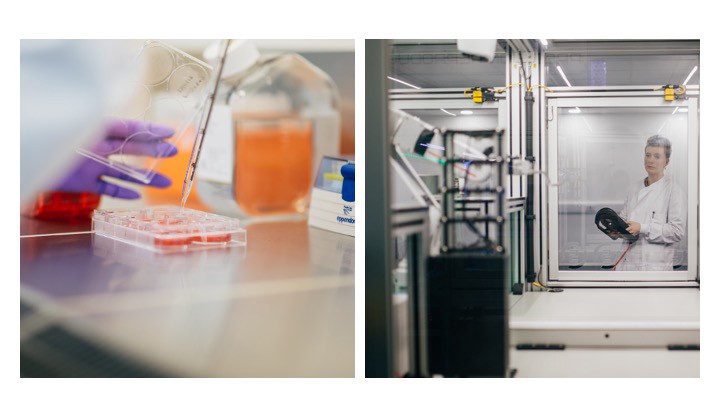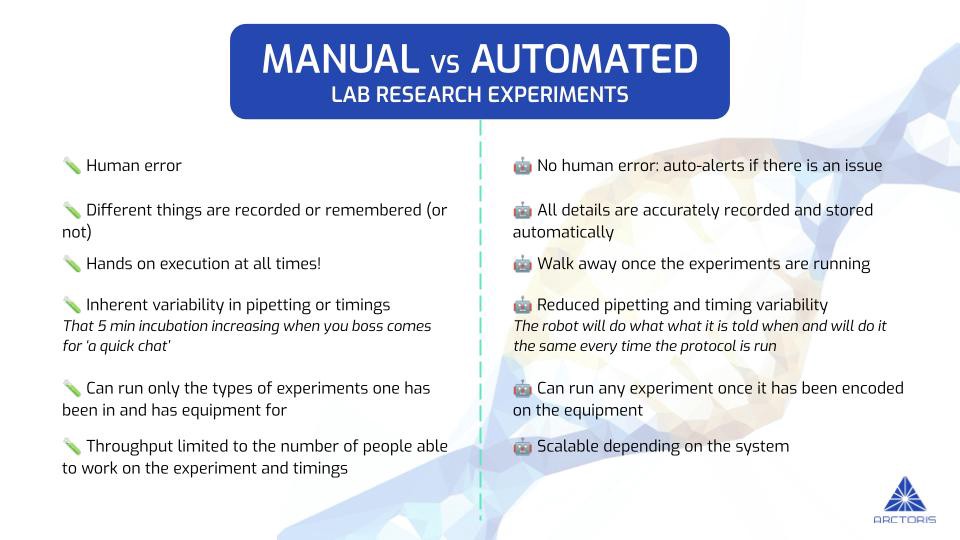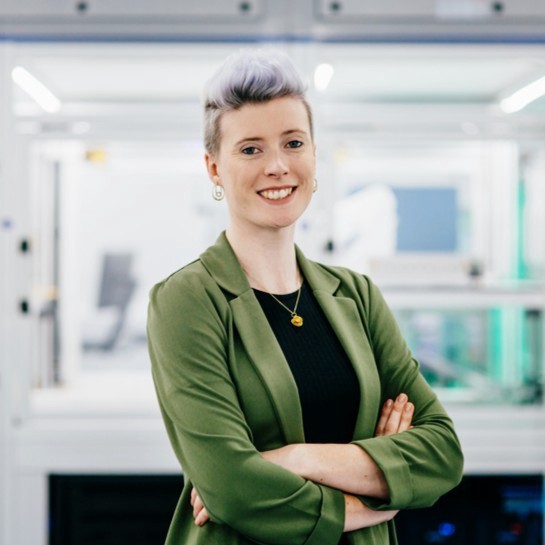Poppy Roworth, Head of Laboratory at Arctoris, responds to the big question.

I started a very long blog post during my PhD based on my experiences of science, aimed primarily at my non-scientific friends. I never finished it, mostly because of time constraints around my PhD and also because it became long and waffly. I will endeavour to do better here. Part of the first paragraph reads: “I do experiments, occasionally they work and I am happy. Mostly they don’t and I am sad, I cry into my crisp sandwich at my desk and then I go home and sleep ready to try again the following day”. Which pretty much sums up PhD life.
The thing is though, I spent SO long in the lab every day that I rarely had the opportunity to keep up to date with the latest scientific findings and this is not due to my poor time-management, but a phenomenon that the vast majority of lab-based scientists face.
The simple fact is that planning, running, and analysing experiments takes an awful lot of time and energy. Even if the experiments are ones you have performed many times before, for new types of experiments that may also require new pieces of equipment, this takes much longer. Additionally, for the most fancy pieces of kit, you need a PhD just to read the manual, or if you are lucky you can go on a 2-day training course. All of which slows down the project and takes more time. Time is limited for all scientists — whether a student with a hand-in date, a postdoc on grant funding that is running out, or as a scientist in a biotech where a clear result is required before the next funding round. The pressure is on from day 1 to maximise data output, but this can limit reading and analysis time which are ultimately the things that provide insight and creativity and really generate novel, groundbreaking ideas and discoveries.
Furthermore, as a cell biologist, I can tell you that a lot of my time is taken looking after my experiments. This doesn’t really require PhD level thought or expertise. You can be trained on how to do this in a few hours and after a few weeks, it is something I could do easily and routinely. Now, whilst I personally enjoy a little bit of cell culture, once you have over 10 cell lines you will be spending an enormous quantity of time doing something that does not require a highly-skilled professional to do. My record was, I think, 25 cell lines in culture at the same time. Which left me very little time to do anything else (e.g. producing actual data). The thing is though, although cell culture is an excellent example, it is hardly the only process in a lab scientist’s life that takes a large amount of time while not necessarily requiring much thought or skill to carry out.
Time is limited for all scientists — whether a student with a hand-in date, a postdoc on grant funding that is running out, or as a scientist in a biotech where a clear result is required before the next funding round. The pressure is on from day 1 to maximise data output, but this can limit reading and analysis time which are ultimately the things that provide insight and creativity and really generate novel, groundbreaking ideas and discoveries.
And of course, the constant time pressure and general exhaustion increases the likelihood of human error — leading to having to start again (such as when I was wondering did I pipette that into well 149 out of 384? As the volume is 1 uL, and the well diameter is 3.65 mm it is difficult to say…).

Although the process of automating experiments does have certain challenges it has come with a lot of benefits. I no longer have to manually pipette each well at a time of a 96 or 384 well plate, which is highly beneficial for my sanity when there is a stack of more than 5 or 10 to get through. This also means I don’t have to worry about accidentally missing a well out — if there is an error in dispensing this information is logged and sent as an error report which means I can decide how to fix this and rescue it if required (goodbye human error!). The accuracy and consistency which automation achieves is far greater than even the most dedicated and highly trained scientist — I finally have error bars I am proud of.
This gives me confidence in the data and in the project. Better data also means fewer unnecessary repeats, saving both time and money. The biggest benefit though is that once the automated protocol is written and everything is loaded I can press go and walk away. This can save hours of each day which allows me to work on other things such as planning the next experiment, designing new projects with clients, reading literature and seeing which experiments can feasibly be automated and keeping up to date with the other projects currently in the laboratory. For others, this time saving might enable them to spend time on developing different assays, analysing data, writing grants and papers.
The accuracy and consistency which automation achieves is far greater than that of even the most dedicated and highly trained scientist — I finally have error bars I am proud of.
I understand that the idea of increasing automation in science might be met with some trepidation from those who love the lab. There will always be a need for manual aspects of science. Until you have a solid, tried-and-tested protocol then you wouldn’t want to spend the time automating the procedure. We routinely perform at least one, often more, manual runs of any new assay so that we as scientists understand the key steps and pinch points inside out so that we can automate it appropriately. Furthermore, there are plenty of types of experiments that you simply can’t run in a fully (or partly) automated fashion due to their complexity and the limitations of robots rather than humans running the show.
Ultimately, automation reduces the time you spend on tedious and repetitive tasks and allows you to take on more interesting or challenging experiments instead. Automation is a powerful tool when used well and should be viewed as an aid to scientists, not as a replacement.

About the author: (Alice) Poppy Roworth DPhil is the Head of Laboratory at Arctoris. Poppy completed her DPhil in Oncology at the University of Oxford (Kellogg College) and her BSc in Biochemistry at the University of Southampton. She worked as a placement student for AstraZeneca in the Oncology iMED unit, employing robotic systems for drug discovery. Poppy has previously worked at OncoRay-Dresden as a Visiting Researcher. She actively promotes women in STEM and has won several awards as a biochemist.